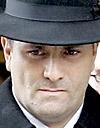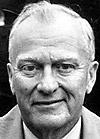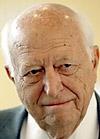How scheming lobbyist operated in Seattle firm

Before joining Seattle-based Preston Gates & Ellis, Jack Abramoff had been involved with South Africa's apartheid regime, Col. Oliver North's campaign to arm Nicaraguan contras, Zaire's dictator Mobutu Sese Seko and Angolan rebel leader Jonas Savimbi, who reportedly had his opponents burned at the stake.
Not the sort of résumé one would expect to appeal to a Democratic-leaning law and lobbying firm with a largely establishment client list. The firm had once turned down a request to represent India in D.C., because of concern for the shaky state of democracy under Indira Gandhi.
But it was a different era when Abramoff showed up. He was a fiercely partisan Republican, and his hiring was announced Dec. 30, 1994 — just days before Newt Gingrich became speaker of the House and Republicans took control of Congress.
Abramoff would emerge as the firm's star in the capital, pulling in millions of dollars and catapulting Preston Gates into the big leagues of lobbying even as his freewheeling style, disdain for authority and penchant for secrecy strained relations with his bosses.
Ultimately, Abramoff's lobbying practice at Preston Gates became a launching pad for schemes of fraud and influence peddling that would play out on a larger scale once he left the firm at the end of 2000 — eventually exploding into one of the biggest lobbying scandals in a generation.
Abramoff admits in a plea agreement that, while at the firm, he tried to corrupt a congressman, influence one House aide by hiring his wife through a Mercer Island-based religious foundation, and sway another by offering a free trip to a Pacific island.
He also committed fraud, helping to fabricate $23 million in financing to gain backing to buy a fleet of casino ships then owned by a client of Preston Gates.
The lobbyist pleaded guilty to four felonies last month and is now cooperating with federal agents in a widening corruption investigation. He and his attorney have declined to comment publicly.
Abramoff worked with about a dozen other lobbyists and staffers at Preston Gates' D.C. office. Most of them left the firm along with Abramoff, a blow to its prestige and a big hit to its billings. One Abramoff associate, Michael Scanlon, pleaded guilty in November to a single count of conspiracy to commit fraud that occurred while he worked at Preston Gates.
Preston Gates has said very little officially about Abramoff's six-year tenure. That's at least partly because Justice Department investigations continue, which firm officials say restrains their ability to comment.
Firm officials say they didn't know about Abramoff's crimes until a government investigation began, after 2004 reports about Abramoff in The Washington Post. Instead, it was his swashbuckling ways that created a conflict. In a statement, the firm made it clear that senior partners tried to rein him in, leading to his departure.
"Abramoff left the firm when it became clear over a number of conversations that there were irreconcilable differences over firm supervision and insistence on teamwork," Preston Gates spokeswoman Genevieve Woodard said.
"Our message was that this was the only way the firm could operate. Instead, Abramoff chose to leave."
The firm
Preston Gates traces its Seattle roots back to 1883. In the Seattle office, where many of the firm's more than 420 attorneys are based, its commitment to public service was exemplified by former members Jim Ellis, perhaps Seattle's archetypal, good-government civic booster, and William Gates Sr., father of Bill Gates.
In the '70s, Preston Gates was known in the Pacific Northwest as a Republican firm.
The D.C. office was opened in 1973 as part of the firm's efforts to expand from legal work into the then-burgeoning world of lobbying Congress and the federal government. Much of that work is done by people employed by large law firms.
By the 1980s, Preston Gates had a strong Democratic tilt, with a cadre of former aides to Sen. Warren Magnuson on staff and a partnership that included Lloyd Meeds, the former Democratic congressman from Everett who maintained close ties on Capitol Hill.
The D.C. operation is officially Preston Gates Ellis & Rouvelas Meeds.
Abramoff's ascension in the firm tracked the rise of Republican power in D.C. After the 1994 elections, Republicans pressured corporations and interest groups to hire Republican-friendly lobbyists. That effort, said Seattle attorney and former Preston Gates partner Eric Redman, was "really brutal and meant to be brutal."
At the time, Abramoff was known as a political organizer more than as a lobbyist. His roots were in the College Republican National Committee.
Later he was involved with Citizens For America, a conservative group that backed President Reagan's support of the Nicaraguan contras, and the International Freedom Foundation, which received money from South Africa's apartheid regime. He lobbied to get a visa for Sese Seko, and with Savimbi organized an anti-communist guerrilla convention in Angola, according to The Washington Post.
Abramoff may have had an unusual résumé, but he claimed powerful GOP connections to Gingrich. The press release announcing his hiring touted his "strong ties to Speaker Newt Gingrich" and other Republicans such as then-House Majority leader Dick Armey.
Firm spokeswoman Woodard says the firm checked out those credentials before Abramoff was hired, and found them to be "excellent."
Those initial credentials, however, are in dispute.
A spokesman for Gingrich said that the former speaker didn't know Abramoff, and he fabricated that relationship. Armey also said he had no relationship with Abramoff.
Armey said he didn't know Abramoff in 1994 and no one at Preston Gates ever asked him about the lobbyist. He said that two of his chiefs of staff knew of Abramoff, and "thought he was a bad guy and did not accept appointment requests from him."
But Abramoff did forge ties with one rising Republican star: Rep. Tom DeLay of Texas. And that relationship would help Abramoff as he emerged as one of the top lobbyists in Washington, D.C., and DeLay — as House majority leader — became one the nation's most powerful politicians.
Lobbyist becomes a star
Abramoff was not an easy fit for Preston Gates. He bridled at some of the firm's policies. He often skipped firm meetings. He acted like a star.
"He demanded his own car and driver, in addition to the firm's, which ... I found a little bit offensive," said Tom Allison, a retired, Seattle-based partner for the firm.
Abramoff also helped recruit a fresh influx of Republican lobbyists who were former congressional aides with strong ties on Capitol Hill.
"He wanted young, aggressive lobbyists who would cry if we lost clients," one of those recruits said. "That's the way he led our lobby team. And his success allowed him to say 'trust me.' "
Abramoff and his team delivered big-dollar accounts, which resulted in soaring revenues for Preston Gates.
During the three-year period that ended in 2000, Abramoff's lobbying clients accounted for roughly 30 percent of the firm's total lobbying revenue of more than $32 million, according to federal disclosure records.
His biggest client was the Mississippi Band of the Choctaw Indians, which in 1999 paid the firm $3.12 million, the most any lobbyist was paid that year by a single client, according to an analysis by the Center for Responsive Politics, a D.C. organization that tracks political spending.
E-mails released by a Senate committee investigating Abramoff indicate the Choctaw account was sometimes tapped for expenses that had little — if anything — to do with the tribe's agenda.
In September 2000, when Abramoff wanted to take a trip to Florida on a deal unrelated to the Choctaws, he asked someone at Preston Gates to bill the plane ticket to the tribe if the other account took more than a week to reimburse the money, according to an Abramoff e-mail.
The Choctaws are in negotiations with Preston Gates about possible billing improprieties, tribal Attorney General Donald Kilgore said.
Kilgore called Abramoff "a scam artist" and said Preston Gates and Abramoff's later firm, Greenberg Traurig, with which the tribe has already reached a settlement, were victimized by the lobbyist. He conceded, though, "When you're one of the top law firms in the world, it's hard to be a victim."
Controversial clients
Abramoff also lobbied on behalf of the Commonwealth of the Northern Mariana Islands, a U.S. protectorate with manufacturers that wanted to keep exemptions from federal minimum-wage laws.
The work rankled some members of the firm, who felt it didn't fit with their view of Preston Gates.
"There were a lot of people in the Seattle office that didn't share the policy goals of his clients, and were uncomfortable with him," Allison said. "He was going after a different market. And a lot of folks were uncomfortable."
As early as March 1998, Abramoff's lobbying for the Marianas was the subject of criticism during a Senate hearing about labor conditions in the islands. Both Republicans and Democrats criticized Preston Gates for teaming up with island garment manufacturers to thwart federal officials trying to curb labor abuses. The strategy was detailed in an Abramoff memo that was reviewed at the hearing.
The day after the hearing, The Seattle Times ran a story headlined, "Firm draws fire for lobby tactics — accused of intimidating officials."
Managing Partner David Tang and Preston Gates Chairman Richard Ford responded with a guest editorial saying the firm had given the islands "a voice in the federal issues that affect it."
They wrote that sometimes "it is necessary to remind people that we do not represent clients based on the popularity of their cause." They said that's a lawyer's role in society.
But Phil Kaplan, who at the time headed a Catholic Church effort to help workers in the islands, said there is a distinction between an attorney's obligation to represent someone in the legal system and the role of a lobbyist.
"When you choose to lobby for someone, you're advocating for them in a public arena and you bear their sins," Kaplan said. "They can't duck that. ... The Preston Gates folks like to think of themselves as liberal, forward-thinking, whatever. Well, they made a dirty buck."
Preston Gates continued to pursue business with the islands, with Abramoff taking a lead role.
In January 2000, he flew with an aide to Rep. Robert Ney, R-Ohio, to the islands in a trip that was part of a scheme to use political influence to obtain and maintain island lobbying clients, according to his plea agreement.
The plea agreement lists the trip among the "official acts and influence" done by public officials in exchange for donations, free meals, concert tickets and other items Abramoff provided.
Recently the governor of the Commonwealth of the Northern Mariana Islands wrote to Preston Gates and another firm where Abramoff later worked, asking that money paid for lobbying be refunded.
The government of the territory claims it was overbilled and potentially bilked and is now suffering from a spate of bad publicity.
In addition to his Preston Gates lobbying, Abramoff, while at the firm, jumped into business ventures. One of those deals caused serious friction with the partners.
Early in 2000, Abramoff joined with Adam Kidan — then owner of a Washington, D.C., mattress-store franchise - to buy a fleet of casino ships operated by Florida-based SunCruz.
Abramoff initially kept his stake in the deal secret from other members of the firm. The seller was a client of Preston Gates and the firm introduced him to Kidan. But officials at the firm say that for months they never knew Abramoff was behind the scenes as Kidan's partner.
In August 2000, Preston Gates officials say, they finally learned of Abramoff's stake in the SunCruz partnership. They were angry but didn't make him withdraw from the SunCruz venture.
Meanwhile, Abramoff and Kidan struggled to find financing to close the deal.
So Abramoff resorted to fraud, according to his plea agreement.
In September 2000, Abramoff used fraudulent documents to convince lenders that his partnership with Kidan had put $23 million in equity into the deal, according to his plea agreement.
Abramoff's departure
Throughout 2000, Preston Gates partners tried to impose discipline on Abramoff and persuade him to conform to their concept of a team player.
In a now oft-cited quote — confirmed by a source who was at the firm at the time — the firm's partner, Manny Rouvelas, told Abramoff he would end up "dead, disgraced or in jail."
But Abramoff's attitude remained rebellious. At one of the last meetings, Abramoff told his bosses that he never wanted to hear the word "teamwork" again, according to someone who worked at the firm at the time and was a part of the conversation.
Abramoff and most of his own team left the firm at the end of December 2000 and moved to Greenberg Traurig, a Miami-based law firm with a larger Washington, D.C., lobbying office.
Though Preston Gates tried to keep some of these lobbyists, many at Preston Gates were glad to see Abramoff go.
"My impression was that this guy was driven by greed, and what drove him to make the change was greed," said Allison, the retired Seattle partner.
"They just had enough of him," said Mary Meeds, widow of Meeds, the former Washington congressman and Preston Gates partner. The congressman passed away last year as the Abramoff scandal grew and the firm responded to Senate and Justice Department investigations.
Meeds says her husband bemoaned the cost to the Preston Gates reputation.
When he read news stories of the scandal, he would say to his wife, "Why are they always putting our firm's name in there?"
Staff reporter Alicia Mundy and researcher Gene Balk contributed to this story. David Postman: 360-943-9882 or dpostman@seattletimes.com



Founded:
1883, by Harold Preston, later known for writing Washington state's Workmen's Compensation Act. Seattle civic booster Jim Ellis joined the firm in 1949.Mergers: The firm grew through a series of mergers including in the early 1900s with O.B. Thorgrimson, and in 1990 with Shidler McBroom Gates & Lucas, which brought to the firm William H. Gates, father of the Microsoft founder.
Current: The firm employs more than 420 attorneys in 11 offices, including Washington, D.C., Anchorage, Beijing and Hong Kong.
Source: Preston Gates